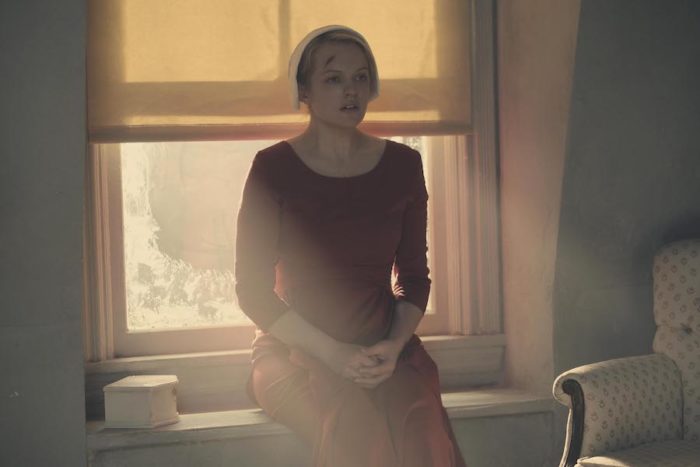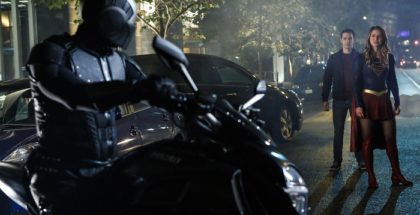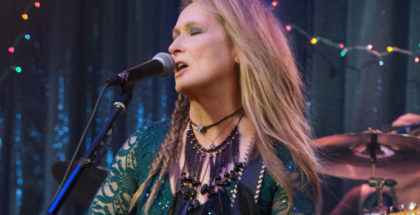UK TV review: The Handmaid’s Tale Season 1 (spoilers)
Review Overview
Cast
10Direction
10Relevance
10David Farnor | On 07, Jan 2018
Warning: This contains spoilers. Not seen The Handmaid’s Tale Season 1? Read our spoiler-free review here.
“Not too hard, OK?” That’s Janine, aka. Ofdaniel, formerly Ofwarren, as she stands in front of her fellow handmaids in the finale of The Handmaid’s Tale Season 1. Guilty of adultery with her household master, he’s brutally amputated as punishment for his lust, but that’s nothing compared to what awaits her: a stoning. And yet, as horrifying as it is, after 10 hours of such cruel oppression, we’re almost used to it.
“Man, I hate stonings,” sighs one, with the kind of casual frustration that someone uses when they have washing up to do. “Don’t be picky,” Aunt Lydia (Ann Dowd) instructs them. “Take one rock each.”
It’s that constant juxtaposition of mundanity and sheer harrowing trauma that makes The Handmaid’s Tale one of the best shows of 2017. It’s a masterclass in immersion, one that crafts a horribly believable alternate reality, which is all the more disturbing because of how close it is to actual reality. Written by Margaret Atwood back in 1980s Berlin, there are obvious themes still pertinent that made adapting it for modern TV a smart idea, but nobody could have foreseen just how well the fictional drama would parallel life off-screen. In the year it aired, US President Donald Trump signed away abortion rights in a room surrounded by men, while stonings and hangings may not make it to our screens but no doubt continue in countless numbers under the eye of ISIS overseas. Even the refugee crisis is recalled by Moira (Samira Wiley) managing to cross the Canadian border in the closing hour – the only downer in that scenario is that Justin Trudeau doesn’t appear in person to welcome her.
It’s not just our world that deserves credit, though, as Bruce Miller and his team have crafted a fictional society that feels all too convincing. There are so many small touches that bring the thing to life, as we follow Offred (Elisabeth Moss), one of many handmaids who have been forcibly kidnapped and turned into surrogates for husbands and wives, a disgusting form of sexual slavery and body control all done in the name of solving a dwindling human population, which has been struck down by infertility.
While Miller’s camera is harrowingly stylish in the way it captures the blood-washed streets, a large part of those tiny details are down to the cast.
Madeline Brewer as Janine, or Ofwarren (later Ofdaniel), is hauntingly sad, while Joseph Fiennes’ Commander Waterford, the man who ritually rapes Ofred so that she can bear his child – watched over by Yvonne Strahovski’s stoic wife, Serena – somehow finds time to show us a twinkling, charming side, as he challenges Moss’ handmaid to games of Scrabble. One night, he touches her thigh during “The Ceremony”, which she reacts even more shocked to than the rest of it – it gets to the point where the abuse and oppression is all so normal that the more conventional form of intimacy weird us out.
Most traumatic of all is Alexis Bledel as Emily, or Ofglen (later Ofsteve), who is punished for being a homosexual, waking up in a spotless, white clinic to find her genitals mutilated. “Gender treachery” is the phrased used by Aunt Lydia to describe her “crime”, but the real terror goes unspoken, with Bledel communicating the sheer barbarism of it in a single look. What’s astonishing about it, and it takes some time for this to sink in, is that we don’t really get to see what Emily’s life was like before the Gilead began its uprising – a marked difference to Offred’s existence, which switches between before and after her imprisonment with a jolting, disorienting effect.
Moss is on towering form in the lead, having to hide Offred’s feelings and let them out in brief bursts. The show’s cameras get in close enough for us to see every twitch of her face, so when something more verbal spills out, it’s all the more heartbreaking: one scene in which Serena locks Offred in a car, while her still-alive daughter is glimpsed through the window, is a gut-wrenching wave of tears and screaming.
If atmosphere were all The Handmaid’s Tale had to offer, that would be impressive enough, but the series skilfully maintains suspense throughout, serving up cliffhanger after cliffhanger to make watching as gripping as it is gruelling. It’s primarily served by watching Offred become more caught up in the resistance, as she bumps into Moira in an underground club, where the Commander takes her on one of their illicit evenings out. So many of the cliffhangers, cruelly, rely on such hope: the discovery of Moira being alive, the revelation that Ofred’s daughter, Hannah, is safe, and even the possible escape of Offred to freedom at the end.
But the twists also take us into the darker side of this world, as we get a taste of Serena’s motivations, which, perversely, are almost sympathetic. “Do not mistake a woman’s meekness for weakness,” she wrote in her diatribe A Woman’s Place, and, as she supported her husband, morally proposed the whole idea of this enforced slavery. “‘The act’ may not be the best thing… from a brand perspective,” she even offered, coming up with the most PR-friendly way to execute the idea.
And yet she still ended up shut out of it all by the plotting and controlling of men. “You could have left me with something,” she snaps, in one moment of unhindered frustration. That self-hate over what was ultimately an act of submission makes Yvonne Strahovski a fascinating, volatile presence to witness – and the bleak end result is reinforced by scenes in which trade negotiations take place and the Commander balances the stress of the economy with the tension in his marriage. By the time he’s talking of oranges and other objects, you realise that his only resource to trade are the handmaids themselves.
Offred is caught horribly in the middle of the relationship, even attempting to play them off against each other – and the dynamic of that single household is compellingly complex. Offred winds up being forced to have sex with chaffeur Nick (Max Minghella), because Commander Waterford is infertile (just to add to the sympathetic shades of grey). “Praise be his mercy,” exclaims Serena, when Offred turns out to be pregnant. “You think I prayed for this?” comes the reply, but even as Offred becomes more outspoken at the absurdity of this being a venture blessed in any way by a benevolent deity, vocalising her shock and horror can’t change anything.
So wide-reaching is the disempowerment and trauma that the show generously finds time for Nick’s only backstory too – he just needed a job and found himself in way over his head, a bit like Orange Is the New Black, if every episode were the finale of Season 4. Ann Dowd’s Aunt Lydia, too, has an arc, as the show doesn’t shy away from exploring the nuances of this fascist society’s enablers. As the series goes on, Lydia acknowledges that things are unfair to the women, but still enforces the rules anyway – a reminder of how easy it is for people wanting to stay on the good side of a tyrannical authority to fall in line.
What emerges is a cycle of giving us hope and crushing it, a momentum that lets us come out from under the show’s grasp just long enough to gasp a breath, before suffocating us once again. That routine is precisely echoed all the way down the production line, even in the way Gilead is presented, all pretty sunlight outdoors and highly filtered gloom indoors.
One last snatch of oxygen takes us to outside Gilead, where we see that Offred’s husband, Luke (a fantastically charismatic O.T. Fagbenle), is alive and surviving. But even here, it’s not plain sailing, as he becomes a refugee – because Offred was his second wife, their union is cruelly not considered valid by the state – and luckily ends up finding safety across the border in Toronto with a mute blonde woman, who is also on the run. (The moral of the story? Everyone should move to Canada.)
After maintaining its barrage of hope and despair all the way to the finale, Season 1 of The Handmaid’s Tale concludes with an excruciatingly well-judged cliffhanger: Serena effectively holds Offred biological hostage. “As long as my baby is safe, so is yours,” she snarls. It’s the ultimate combination of good and bad news, as Offred is bundled into a van and driven away. Is it to escape, or to further punishment? And should we take comfort in the fact that Offred is, in theory, safe for now, as is her daughter?
Unlike Atwood’s novel, though, the series is returning for a second season, which will continue the story and give us an answer to that question. And, with the revelation that Offred’s name is actually June, the stage is set for an uprising that could bring down Gilead once and for all. That stoning, you sense, is just the beginning, as Offred leads a protest and all the handmaids walk away, refusing to participate. “They should never have given us a uniform if they didn’t want us to be an army,” she concludes, as they march down the empty street, with Nina Simone’s Feeling Good swaggering on the soundtrack in the background. Directed with class by Kari Skogland – one of many women directors at the helm of the show, which, in itself, is something to celebrate – it’s a brief moment of air-punching optimism. After 10 episodes of bleak, depressing, harrowing viewing, it’s a victory that feels hard-earned and leaves you desperate to found out what happens next. Having to wait several months for a second season, though, is nothing to be sad about: The Handmaid’s Tale is a masterful piece of television and the most important drama released in the last year, but when a masterpiece is this uncompromising, you don’t want to get too used to it.
The Handmaid’s Tale: Season 1 to 3 is available to watch online on Amazon Prime Video as part of a Prime membership or a £5.99 monthly subscription. It is also available on All 4.
























